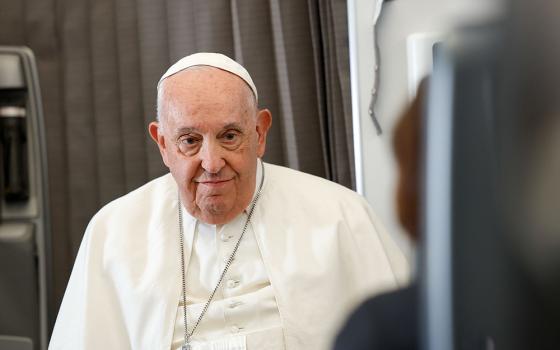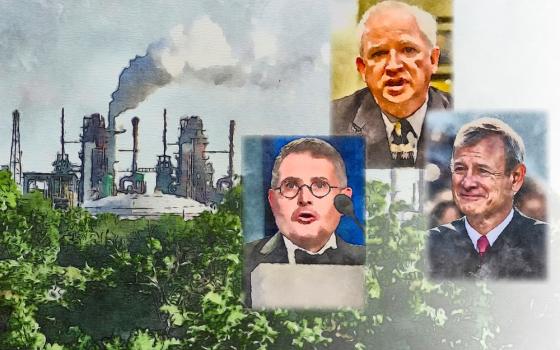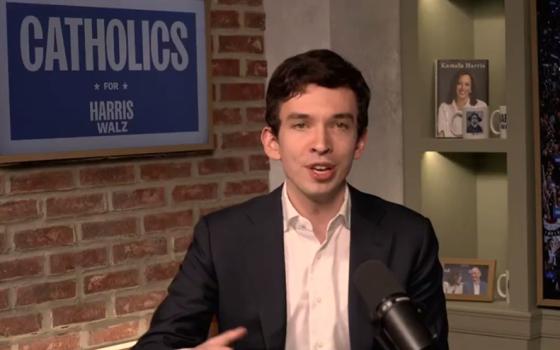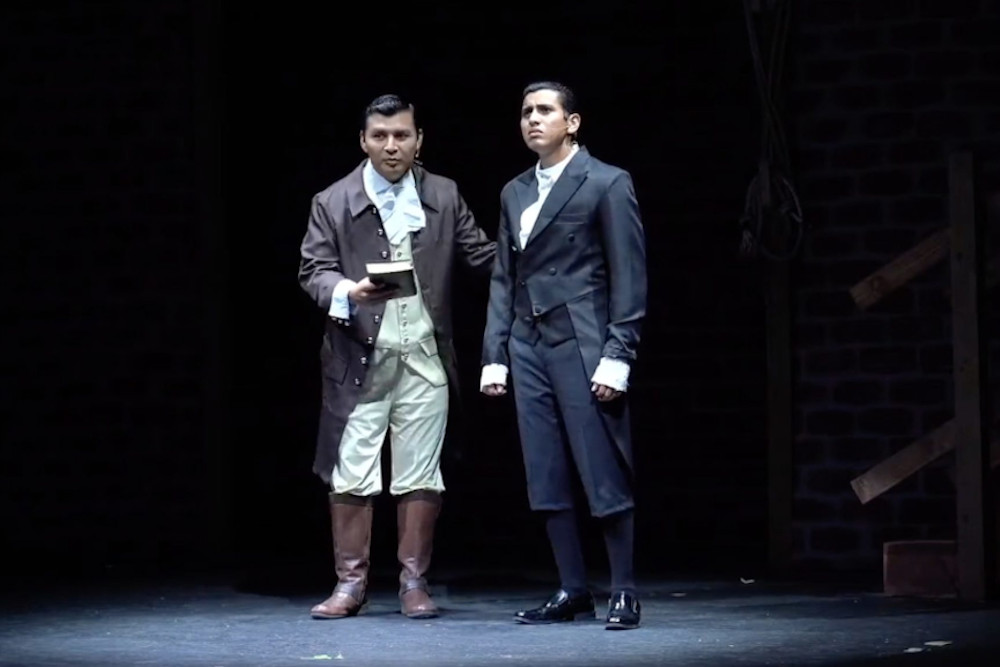
Alexander Hamilton, right, gives his life to Jesus in The Door Church's unauthorized production of the musical "Hamilton," in McAllen, Texas. (RNS/screen grab)
When offered a chance to save his soul at a Texas church last weekend, Alexander Hamilton did not throw away his shot.
During a slightly adapted production of the hit musical "Hamilton" at The Door Church, a large, diverse congregation, the main character bowed his head, closed his eyes and gave his life to Jesus.
"What is a legacy?" the actor playing Hamilton said, according to a recording of the show obtained by Religion News Service. "It's knowing you repented and accepted the gospel of Jesus Christ that sets men free."
There was just one problem. The church did not have the rights to perform "Hamilton" or post videos from a performance online.
"'Hamilton' does not grant amateur or professional licenses for any stage productions and did not grant one to The Door Church," a spokesperson for the musical told RNS in an email.
After learning about the unauthorized performance on social media, the producers of "Hamilton" sent a cease-and-desist letter to the church, instructing them to remove all videos and other images of the Aug. 5 performance. The producers did tell the church it could go ahead with a performance on Aug. 6, provided the performance was not recorded, no images of the event were posted online and no additional productions would be staged.
According to a statement from the producers, they planned to discuss "this matter with the parties behind this unauthorized production within the coming days once all facts are properly vetted."
Advertisement
Written by actor and composer Lin-Manuel Miranda, "Hamilton" reimagines the early days of the United States with a diverse cast and a hip-hop inspired score. The musical debuted in 2015 and became a pop culture juggernaut.
A staffer told RNS the church has no comment about the production. During a worship service, pastor Roman Gutierrez acknowledged that the church was contacted by a lawyer from "Hamilton" and had removed the videos.
"We had over 30 people get saved between both nights, and that is really why we do these plays," he said. "For people to get saved."
The church website contains links to previous church productions of "Toy Story," "Despicable Me," and "Beauty and the Beast," using images from films of those stories.
Videos of the church's "Hamilton" included a series of references to Jesus not found in the original play. In a scene between Hamilton and his wife, Eliza, she tells him that everything will be all right if he gives his life to Jesus.
"God is not who I need right now," Hamilton replies.
Following the production — which included costumes and an extensive set that seemed to replicate that of the Broadway show — a pastor gave an altar call. He told people that no matter their struggles, whether it was finances, addictions or homosexuality, God could help them.
The comparison of LGBTQ people to people with addictions angered "Hamilton" fans. So did the use of a beloved show without permission.
Doing so was the equivalent of stealing, said secular commentator and writer Hemant Mehta, who posted about the church on social media. Church leaders should have known better, he said.
"Are you telling me that no one involved in putting on this show asked the question, can we do this?" he said.
Jake Johnson, associate professor of musicology at Oklahoma City University, said that while there are serious ethical and legal issues involved, he was impressed by the sophistication of the church production. But he was not surprised by it. Churches have long adapted works of pop culture to spread their messages, he said. And they are not above changing the text or even adding songs from other sources to get their point across.
The most extreme example, he said, is the "Re-Sound of Music," a reworking of "The Sound of Music" to promote the polygamist beliefs of the Fundamentalist Church of Jesus Christ of Latter-Day Saints. That music, which still exists online, turns a song called "You Two," originally sung by a father to his children in the movie version of "Chitty Chitty Bang Bang" into a polygamist anthem.
A Canadian church is also known for creating Christian-themed plays based on popular movies and musicals, including one called "The Passion of the Iron Man," in which the Marvel hero is crucified while the villainous Loki sings R.E.M.'s "The End of the World as We Know It."
Musicals are also uniquely suited to be used by religious groups, said Johnson, author of Lying in the Middle: Musical Theater and Belief at the Heart of America, which looks at church adaptations of musicals.
"Musicals are almost always a kind of Christian narrative, in the sense that they're about reconciliation and redemption," he said. "Even if it's not overtly about religion at all, the story can easily slide into this pocket of Christian idealism where everything works out in the end and the good guys win and the bad guys will be vanquished."
Johnson also said that musicals appeal to a wide range of American society, including theater-going audiences in liberal cities like New York as well as a red state like Texas. The church adaptation is a kind of homage to the power of musicals to bring people together, he said.
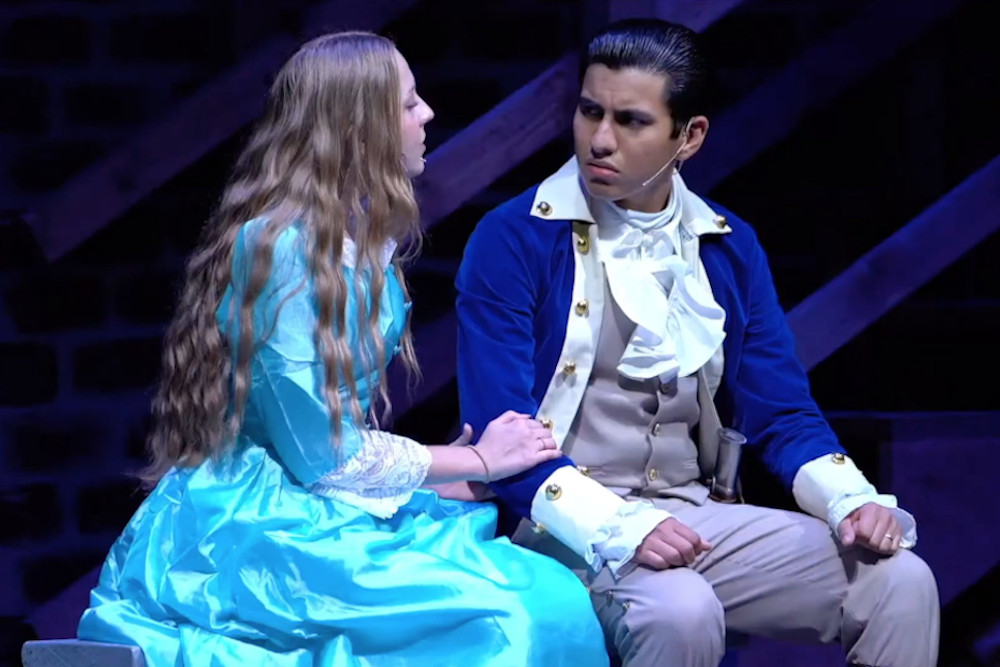
A scene between Alexander Hamilton and his wife, Eliza, in an unauthorized production of the musical "Hamilton," at The Door Church in McAllen, Texas. (RNS/screen grab)
Author and historian Peter Manseau also sees some parallels between "Hamilton" and more overtly religious musicals.
"'Hamilton' is in some ways a show in the mold of 'Jesus Christ Superstar' and 'Godspell,' which also began as radical new tellings of a familiar story," he told RNS. "Given the popularity of 'Hamilton,' it's almost inevitable churches would try to repurpose it, even in ways counter to the show's intentions."
Musicals can also be a way for churches and other faith groups to bring people together. For a number of years, Bethany Lutheran Church in Crystal Lake, Illinois, has put on musicals like "Joseph and the Amazing Technicolor Dreamcoat" and "Mary Poppins."
The church pays for the rights to perform those shows, said Ruth Ann Poppen, director of worship and music, and sees them as a way to help people in the church and the community build their musical skills and self-confidence — and to celebrate the talents in the community. Half the cast from a recent version of "Mary Poppins" came from outside the church.
"It is a way for us to reach out to be more visible and have people come into our sanctuary outside of really regular worship services," she said.
Howard Sherman, an arts administrator, writer and advocate, said churches and other groups can stage musicals if they get the rights to them. The church in Texas did not do that, which he found concerning. Copyrights help artists make a living and give them the right to control their own work.
"That is a lesson that anyone in a leadership capacity, an educational capacity, or an ethical capacity should be teaching people, especially young people," said Sherman, who posted about the Texas play on Twitter.
Mehta suggested, in the spirit of musicals, a redemptive resolution to this situation, allowing the Texas church to make amends.
"I would love to see them make a sizable donation to a fine arts program — that might be a way to make up for what they have done and allow everyone to benefit."
[Kathryn Post contributed to this story.]
